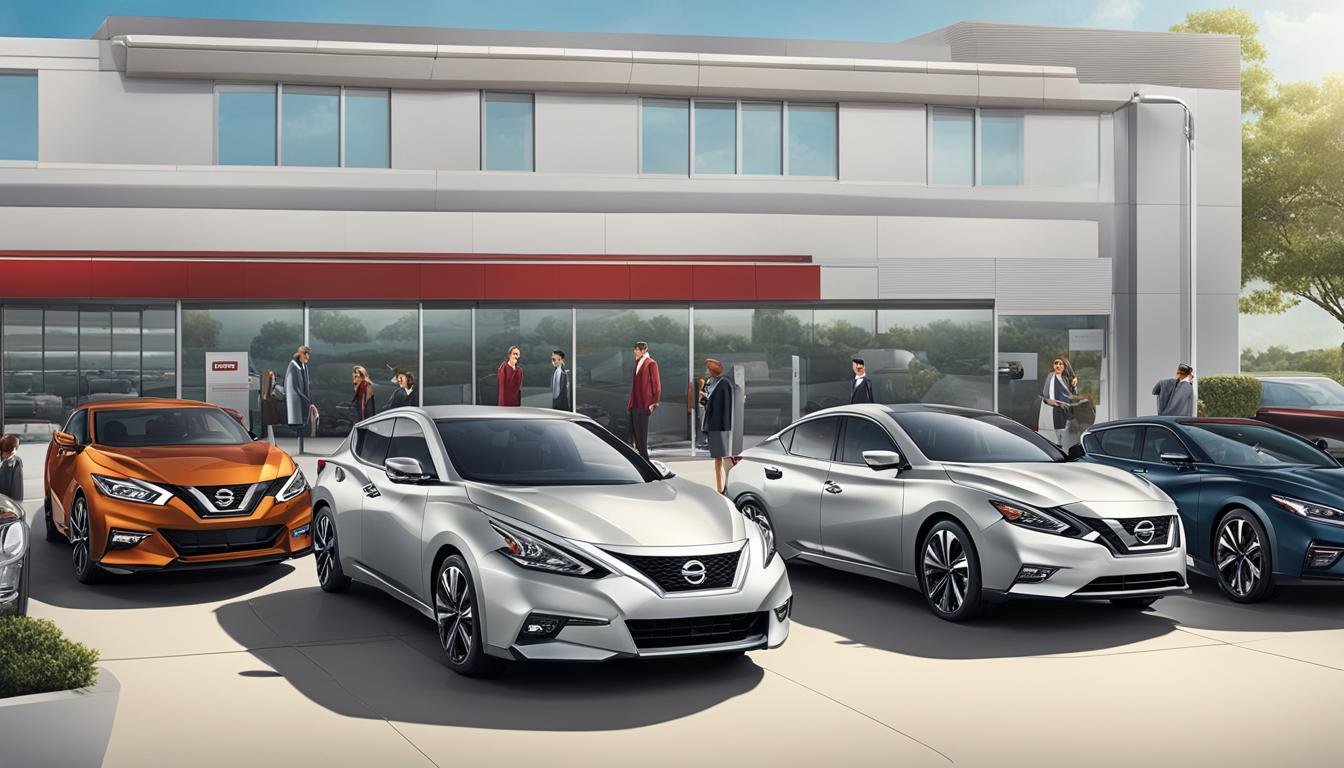When it comes to purchasing a car, affordability is often a top consideration. That’s where Nissans come in. Known for their low prices and great value, Nissans have become a popular choice for budget-conscious buyers. But have you ever wondered why Nissans are so cheap? In this article, we dig deep into the factors behind the affordability of Nissans, exploring everything from their partnership with Renault to their use of cost-cutting measures. So, if you’ve ever pondered about the reasons behind their low price, read on to uncover the truth behind the affordable brand.
Key Takeaways
- Despite their low prices, Nissans are well-made and offer great value for budget-conscious buyers.
- The alliance with Renault and Mitsubishi has allowed Nissan to reduce production costs and offer cheaper cars.
- The use of cost-cutting measures, such as CVT transmissions, has contributed to the affordability of Nissans, but also raised concerns about reliability.
- Nissan’s use of cheaper car parts and plastic materials has helped lower the overall price, but it may impact reliability and durability.
- Nissan’s marketing decisions and reputation as an affordable brand rather than a luxury brand have influenced their pricing strategy.
The Impact of the Renault Alliance on Nissan’s Pricing
In 1999, Nissan was facing financial difficulties and was on the brink of bankruptcy. However, a lifeline came in the form of a strategic alliance with the French company Renault. This alliance, which also included Mitsubishi, had a significant impact on Nissan’s pricing strategy.
By merging resources and sharing production facilities, the Renault Alliance enabled Nissan to reduce its production costs. This reduction in costs directly translated into more affordable cars for consumers. The Renault Alliance allowed Nissan to streamline its operations and benefit from economies of scale, resulting in cheaper cars without compromising quality.
The alliance also allowed Nissan to leverage Renault’s expertise in manufacturing processes and supply chain management. By optimizing these areas, Nissan was able to further lower its production costs and pass on the savings to customers. As a result, consumers can enjoy the benefits of owning a Nissan at a more affordable price point.
The Benefits of the Renault Alliance
The Renault Alliance not only saved Nissan from bankruptcy but also played a crucial role in the brand’s pricing strategy. By reducing production costs and leveraging shared resources, Nissan was able to offer cheaper cars without compromising on quality. This partnership remains a significant factor in why Nissans are known for their affordability today.
Overall, the Renault Alliance has had a transformative impact on Nissan’s pricing strategy. Through collaboration and resource-sharing with Renault and Mitsubishi, Nissan has been able to produce and offer cheaper cars to consumers. This alliance has allowed Nissan to maintain its reputation for affordability while delivering vehicles that are well-made and reliable.
The Role of Cost-Cutting Measures in Nissan’s Pricing Strategy
Nissan’s commitment to affordability is supported by various cost-cutting measures they employ in their pricing strategy. One significant factor is the use of continuously variable transmissions (CVT) in their cars. CVT transmissions offer smoother acceleration and improved fuel efficiency compared to traditional automatic transmissions. However, they have their drawbacks. CVTs lack a separate cooling loop, making them prone to overheating, which can compromise their reliability.
Another aspect of Nissan’s cost-cutting measures is evident in their rapid depreciation rate. While this may be advantageous for budget-conscious buyers who plan to upgrade their vehicles frequently, it can also impact the resale value for those looking to sell or trade-in their Nissan. Additionally, some Nissan models have been criticized for their lower interior quality compared to competitors, which is another result of their cost-cutting efforts.
The Impact of CVT Transmissions
The use of CVT transmissions in Nissan’s cars has certainly contributed to their affordability. However, it’s important for potential buyers to be aware of the potential reliability issues associated with this technology. Overheating can lead to premature wear and damage to the transmission, resulting in costly repairs. It’s advisable for owners of Nissan vehicles with CVTs to closely monitor their transmission’s temperature and follow proper maintenance procedures to mitigate any potential issues.
In summary, while Nissan’s cost-cutting measures have allowed them to offer more affordable cars to the market, there are trade-offs to consider. CVT transmissions and their associated reliability concerns, rapid depreciation rates, and lower interior quality may impact the overall ownership experience. Buyers looking for a budget-friendly option should take these factors into account when considering a Nissan.
The Impact of Using Cheaper Car Parts and Plastic Materials
In their pursuit of affordability, Nissan makes use of cheaper car parts and plastic materials in their manufacturing process. While this allows them to keep the overall price of their cars low, it comes with certain drawbacks. The use of cheaper car parts and plastic materials can lead to reduced reliability and durability in Nissan vehicles.
One of the consequences of using cheaper car parts is the potential for decreased reliability. These parts may be more prone to breakdowns and failures, leading to higher maintenance costs for owners. Additionally, the use of plastic materials in key components can result in lower overall vehicle quality, affecting both performance and safety.
Customers have reported issues such as rust in outer body parts, which can be a result of using cheaper materials that are more susceptible to corrosion. Furthermore, the reliance on plastic materials can impact the safety of the vehicle, as they may not provide the same level of protection in the event of a collision.
The Trade-Off: Affordability vs. Reliability
It is important for consumers to consider the trade-off between affordability and reliability when purchasing a Nissan vehicle. While the lower price point may be appealing, it’s crucial to weigh the potential risks associated with cheaper car parts and plastic materials. Conducting thorough research, reading customer reviews, and consulting with automotive experts can help potential buyers make an informed decision.
Ultimately, Nissan’s use of cheaper car parts and plastic materials plays a significant role in the affordability of their vehicles. However, it’s important to be aware of the potential impact on reliability and durability. Making an informed choice based on personal needs, preferences, and budget will ensure that consumers find the right balance between affordability and quality.
Marketing Decisions and Reputation Impacting Pricing
Nissan’s pricing strategy is influenced by its marketing decisions and reputation in the automotive market. One of the key factors contributing to the lower prices of Nissan cars is the brand’s positioning as a more affordable option rather than a luxury brand. By targeting budget-conscious consumers, Nissan aims to offer cost-effective transportation solutions without the premium price tag often associated with luxury vehicles.
An important aspect of Nissan’s pricing strategy is the use of outdated technologies in some of its car models. While this may contribute to lower production costs, it can also lead to a perception that Nissan cars are not technologically advanced compared to their competitors. However, it is worth noting that Nissan has been making efforts to update its technologies in recent years, introducing features such as advanced driver-assistance systems and electric vehicle technology.
Nissan’s reputation has also had an impact on its pricing strategy. The brand has faced various scandals in the past, such as the controversy surrounding former CEO Carlos Ghosn and the tampering of test reports. These scandals have affected consumer trust and confidence in Nissan, resulting in decreased sales and the need to adjust pricing to remain competitive in the market.
Impact of Marketing Decisions and Reputation on Pricing
Overall, Nissan’s marketing decisions and reputation play a significant role in shaping its pricing strategy. By positioning itself as an affordable brand and adapting to changing technological advancements, Nissan aims to target consumers who prioritize value for money. However, the brand’s reputation challenges and the perception of outdated technologies can impact consumer perception and influence pricing decisions. Moving forward, Nissan will need to continue addressing these challenges while offering competitive prices to maintain its position in the automotive market.

Conclusion: Finding Value in Nissan’s Affordable Cars
While some may question the low price of Nissan cars, it is important to recognize that affordability does not necessarily equate to poor quality. In fact, there are several reasons why Nissan cars are a budget-friendly option that still offer value to customers.
One of the main reasons for the cheap price tag of Nissan cars is the brand’s focus on being an affordable option rather than a luxury brand. This means that while some competitors may boast higher-end features and materials, Nissan aims to provide reliable transportation at a more accessible price point.
Another factor contributing to the affordability of Nissan cars is the use of cost-cutting measures, such as the utilization of cheaper car parts and plastic materials. While this may result in reduced reliability and durability compared to more expensive counterparts, it allows Nissan to offer their vehicles at a more affordable price, making them an attractive option for individuals on a budget.
Ultimately, the decision to purchase a Nissan should be based on personal needs, preferences, and budget. For those seeking a reliable and budget-friendly option, Nissan cars can provide a great value. However, it is essential to consider the potential trade-offs, such as the use of cheaper parts and materials, and the associated reliability concerns. By making an informed decision, customers can find a Nissan that meets their needs without breaking the bank.
FAQ
Are Nissans of poor quality because they are cheap?
While Nissan cars are cheap, it does not necessarily mean they are of poor quality. The affordability of Nissan cars allows customers to find value in their purchases. However, it is important to consider factors such as the use of cheaper parts and plastic materials, as well as potential reliability issues.
How did the alliance with Renault impact Nissan’s pricing?
In 1999, Nissan faced financial difficulties and was on the verge of bankruptcy. The French company Renault stepped in and formed an alliance with Nissan, along with Mitsubishi. This partnership allowed the companies to merge resources and reduce production costs, resulting in cheaper cars for consumers.
What cost-cutting measures did Nissan implement?
Nissan’s cost-cutting measures include the use of continuously variable transmissions (CVT), which have contributed to the affordability of their cars. However, these measures have also resulted in compromised reliability, as the CVT lacks a separate cooling loop and is prone to overheating. Additionally, some Nissan models have a rapid depreciation rate and lower interior quality compared to competitors.
Why are Nissan cars cheaper due to the use of cheaper car parts and plastic materials?
To keep costs low, Nissan uses cheaper car parts and plastic materials in their manufacturing process. While this helps reduce the overall price of their cars, it also leads to decreased reliability and durability. Customers have reported issues such as rust in outer body parts and a decrease in overall safety.
How do Nissan’s marketing decisions and reputation impact their pricing?
Nissan’s marketing decisions, including the use of outdated technologies and positioning as a more affordable brand rather than a luxury brand, have contributed to their lower prices. Additionally, scandals involving the previous CEO and tampering with test reports have negatively impacted Nissan’s reputation and sales, further influencing their pricing strategy.
Should I consider purchasing a Nissan based on their affordability?
The affordability of Nissan cars allows customers to find value in their purchases. However, it is important to consider factors such as the use of cheaper parts and plastic materials, as well as potential reliability issues. Ultimately, the decision to purchase a Nissan should be based on personal needs, preferences, and budget.

